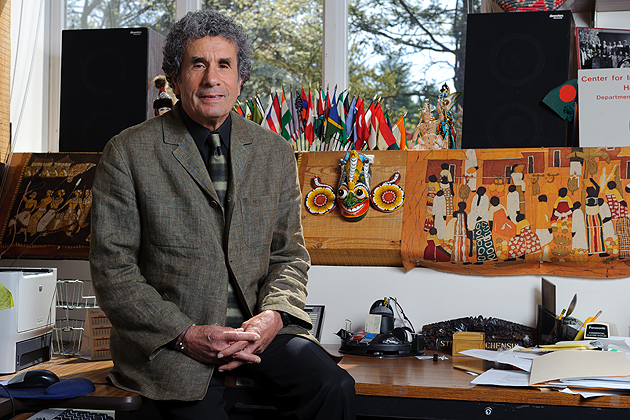Well into his fourth decade on the UConn School of Medicine faculty, anthropologist Stephen Schensul has spent a career studying health status and health care in underserved areas both in the United States and internationally, including in Peru, Sri Lanka, and Mauritius.
For the past 10 years now, the focal point of his research and intervention has been Mumbai, India.

Schensul, professor in the Department of Community Medicine and Health Care, is principal investigator of an Indo/U.S. project funded by the National Institutes of Mental Health, studying the prevention of HIV and other sexually transmitted infections (STI) among married women in Mumbai’s low-income communities. These communities represent almost half of the population in Indian cities; they must cope with limited and crowded housing, and insufficient water and poor sanitation.
Populations living in such conditions tend not to place sexual health among the chief concerns. The challenge is to link a particular project’s objectives with community- and culturally-based concerns.
Schensul is part of a group overseeing a multifaceted approach to the research, which aims to help the people he’s studying, with clinical care, counseling, couples intervention, and community education for today; and knowledge and resources to sustain and improve health for tomorrow.
“I think that we’ve shown over these 10 years a significant drop in sexually transmitted infections and husbands’ extramarital behavior, and demonstrated that we could engage primary care physicians – both allopathic [biomedical] and those in the indigenous Indian systems of medicines like ayurveda – to help deliver treatment and messages that reduce sexual risk and STIs,” Schensul says.
The project is part of a larger program titled “Research and Intervention in Sexual Health Theory to Action,” fittingly forming the acronym RISHTA, which in Hindi-Urdu means “relationship.”
Relationships have been central to Schensul’s projects, internationally and as a key intervention point to reduce sexual risk.
Reducing stigma
Schensul’s first grant in India goes back to 2001, when the focus was on married men and sexual risk. A year later came a supplement to that grant to study women’s risk in marriage.
As the grant’s principal investigator, Schensul and his Indian counterparts have established an office near the community with a team of about 20 on the ground, including physicians, counselors, outreach workers, and other staff who deal with coordination and data management.
That group is joined regularly by Schensul and others from the UConn Health Center, who most recently include Purnima Mehrotra, a postdoctoral fellow with a focus on health communications; Marie Brault, an anthropology doctoral student focusing on early marriage and sexual health; and Dylan Graetz, a third-year medical and master’s in public health student working on anemia among adolescent girls. Additionally, Indian senior investigators from the International Center for Research on Women, the Tata Institute for Social Sciences, and the Topiwala National Medical College and Population Council are involved in the projects.

Schensul, the head of UConn’s Center for International Community Health Studies, says any success in this effort would not be possible without those collaborations, which help address the many obstacles in an undertaking of this magnitude.
For instance, the Topiwala National Medical College supports the physicians who staff the urban health center in Mumbai, where Schensul’s project has established a women’s health clinic. In addition to providing care, the clinic is an entry point for study participants.
“Most primary care centers in developing countries are maternal and child-health focused,” says Schensul. “The services they offer are primarily geared for expectant or new mothers, with limited attention to women’s own gynecological and related health problems.”
The women’s health clinic, Schensul says, addresses these problems as well as providing auxiliary services to meet diverse needs. Women who consent to participate in alternative support services can receive individual counseling, group couples intervention, or a combination of both in addition to their medical care.
Lasting changes
“The individual counseling at a primary care center has formed the basis for a model of how you could deliver mental health services,” he says. “Mental health services in the developing world are very limited or non-existent. So this idea of a counseling unit within a primary care center, which is where women would bring their problems anyway – they ‘physicalize’ their problems – has worked.”
The project has also engaged community-based organizations, social services, and the Islamic religious sectors to disseminate messages focused on reproductive and sexual health and programs, which the organizations will maintain after the end of the project in 2013. The organizations can distribute messages on the importance of women’s health, the need to decrease violence against women, as well as the importance of husband-wife communication and reducing sexual risk behavior.
“We’ve been able to show an impact on the much broader concept of sexual health that would include positive aspects of sexuality and prevention of disease,” says Schensul. “And we’ve made a positive shift in community norms concerning gender equity, especially among men, who have shown less patriarchal norms in the course of the project.”
Follow the UConn Health Center on Facebook, Twitter and YouTube.


